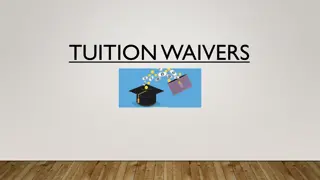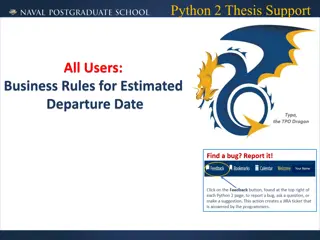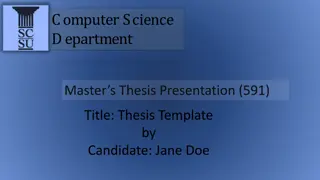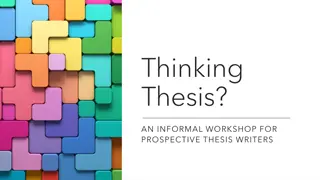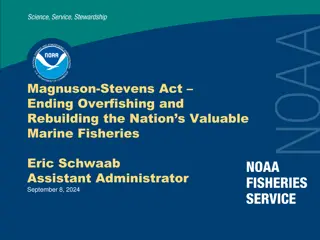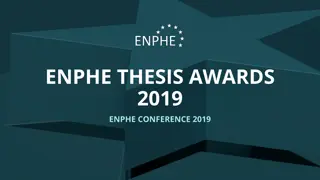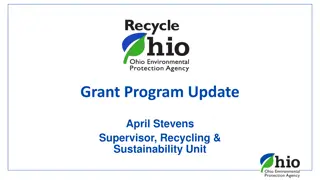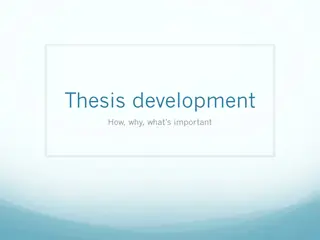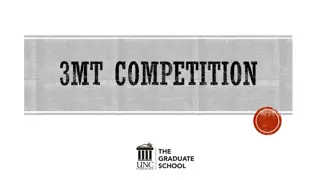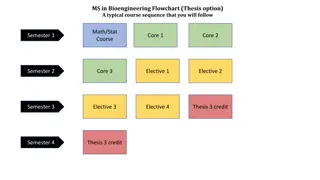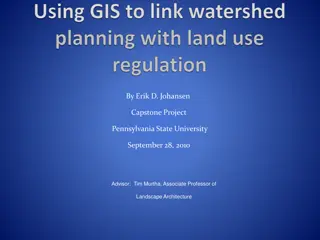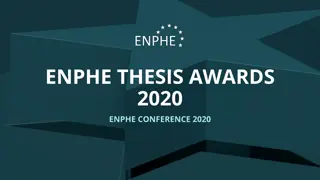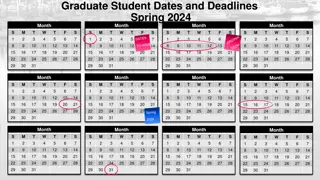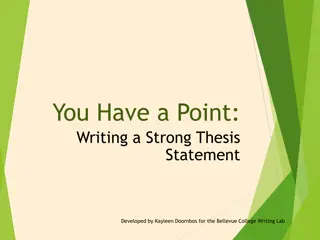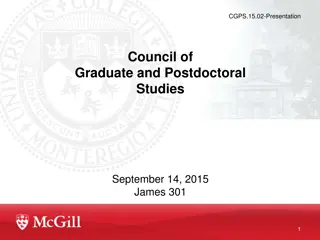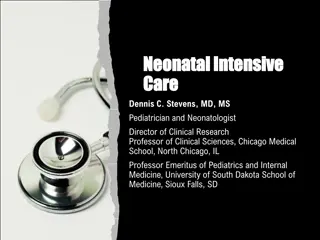Dr. Cynthia Stevens Graduate Thesis Conference 2018
"Explore Dr. Cynthia Stevens' insightful research presented at the DePaul University Graduate Thesis and Dissertation Conference 2018. Discover strategies for time management, success planning, and self-improvement. Gain valuable insights into prioritization and action planning to boost productivity and efficiency in your daily life."
Download Presentation

Please find below an Image/Link to download the presentation.
The content on the website is provided AS IS for your information and personal use only. It may not be sold, licensed, or shared on other websites without obtaining consent from the author.If you encounter any issues during the download, it is possible that the publisher has removed the file from their server.
You are allowed to download the files provided on this website for personal or commercial use, subject to the condition that they are used lawfully. All files are the property of their respective owners.
The content on the website is provided AS IS for your information and personal use only. It may not be sold, licensed, or shared on other websites without obtaining consent from the author.
E N D
Presentation Transcript
How SAIs Audit How SAIs Audit D During Pandemic? uring Pandemic? PAS Meeting London, 2022
Introduction Introduction: All SAIs experienced some sort of challenges while auditing during pandemic. Challenges were manifold (practical, methodological etc.). Some guidance to audit COVID-19 already exists and is available. However, it might be still useful to share experience within the PAS. 2 key areas to present health and education. Both centered on service continuity.
Continuity of Continuity of Basic Health Services Services Basic Health
Audit Scope Audit Scope Subject Matter: Actions taken by the responsible parties for provision of fundamental healthcare state programs, in terms of provision of complete and timely services. Auditees: Ministry of Healthcare, National Center for Disease Control and Public Health, National Health Agency and Regulatory Agency of Healthcare and Pharmaceutical Activities. Audit period: 2020-2021 years. Audit covered state health services defined by WHO as basic in June, 2020 and recommended that their continuity should be ensured. Audit assessed effectiveness of measures taken for safeguarding wide spectrum of health services (prevention, diagnostics, treatment).
Audit Scope Audit Scope Planned Budget (thousands of GEL) for 2020-2021 fiscal years Selected 8 Basic Health Programs 1 602 136 General State Health Insurance (Oncology Services) 66 388 Immunization 16 000 Health of Mothers and Children Mental health 56 400 Diabetes Management 34 693 Rare Diseases 26 404 Hepatitis C 14 000 Fostering health 2 625
Findings: Deficiencies in Service Provision Findings: Deficiencies in Service Provision Compared to 2019, in years 2020-2021 number of users of regular ambulatory services for Diabetic patients is significantly reduced (by 28%.) Trend is similar in case of Rare Diseases and Hepatitis C (by 43.5% and 27% respectively). Despite significant reduction of ambulatory service user Diabetic patients, within the Diabetes Program demand for medication has increased, which might be an indicator for increased service need.
Findings: Deficiencies in Service Provision Findings: Deficiencies in Service Provision Number of medication and ambulatory service user beneficiaries with rare diseases (2018-2021) Number of medication and ambulatory service user diabetic beneficiaries (2018-2021) 35000 1800 1601 1600 28904 28446 30000 27562 26570 1400 1226 25000 1161 1200 1076 20000 1000 Medication Use Medication Use 800 15000 Ambulatory Visits Ambulatory Visits 600 10000 459 446 400 6370 6068 5000 4604 200 185 3193 114 0 0 2018 2019 2020 2021 2018 2019 2020 2021
Findings: Deficiencies in Service Provision Findings: Deficiencies in Service Provision Number of services received under the Hepatitis C Management Program by years and months and annual referral rate
Findings: Deficiencies in Service Provision Findings: Deficiencies in Service Provision The mechanisms introduced in 2020-2021 did not adequately ensure the timely delivery of immunization services during pandemic. Compared to 2019, the coverage rates in 2020 and 2021 have decreased for the following vaccines: Hexa - by 5% and 8%, MMR II - 20% - And 16%, and tetanus-diphtheria - 24% and 25%. 97% 95% 93% 100% 92% 89% 88% 88% 85% 81% 77% 80% 65% 64% 2018 60% 2019 40% 2020 2021 20% 0% Hexa MMR II Tetanus-Diphtheria
Findings: Findings: Deficiencies in Service Provision Deficiencies in Service Provision Out of surveyed 225 beneficiaries of different basic health services, 186 indicated that they were not offered an online consultation by the respective medical institution. No mechanism has been developed by the Agency to provide remote access to the basic services. Have you been offered by healthcare providers possibility of remote service? Diabetic benefriciaries Beneficiaries with rare diseases Beneficiaries of antenatal care 2 6 5 11 24 103 42 yes no I don't recall yes no yes no
Distance Distance learning in in Public Public Schools learning Schools
Audit Audit S Scope cope Subject Matter: Efficiency and effectiveness of measures taken by responsible parties to promote distance learning. Auditees: the Ministry of Education and Science of Georgia, LEPL - National Center for Teacher Professional Development (Center) and LEPL - Education Management Information System (EMIS). Audit period: 2020-2021 years
Audit Audit S Scope cope Preparedness The pandemic response crisis management strategy of countries was mainly based on a multi-stage systemic response approach. Consideration of experiences for the future Response Managing long-term results
General Information General Information On March 21, 2020, a state of emergency was declared in Georgia and schools have moved to distance learning mode; Virtual classrooms for all public school classes and subjects have been created in Microsoft Office 365 Teams; The project TVSchool started; The distance learning rule was approved and the daily workload of students and the school timetable were determined; A memorandum was signed with ISPs, in which a special mobile internet package was offered to teachers and students; Webinars and seminars for teachers were conducted and various electronic resources were developed; Since 2020, all teacher training has been conducted online, using teams.
Findings: Preparedness Findings: Preparedness UNICEF conducted a global analysis in August 2020 based on data from 100 countries on how well students received their education after moving to distance learning. According to the research conducted: At least 31% of students worldwide fail to participate in distance learning programs, mainly due to lack of necessary resources; 40% of countries failed to provide distance learning opportunities at the primary education level.
Findings: Preparedness Findings: Preparedness The Ministry does not have complete information on what part of the students have access to computer equipment and the internet. About 50% (16,184 units) of computer equipment in schools are satisfactory in terms of technical parameters, while the remaining 50% are identified as outdated and defective.
Findings: Preparedness Findings: Preparedness Survey results of parents of 12th and 1-9th grade students indicate problems with access to computers and internet by students. 1 1- -9 9th th grade Has no access to the internet 1 1- -9 9th th grade Has no access to the computer grade grade 12 12th th grade grade Has no access to the internet 12 12th th grade grade Has no access to the computer 3%7% 4% 10% 6% 8% 20% Very Frequently Frequently Never Very Rarely Sometime 22% 29% 14% 37% 16% 27% 30% 14% 19% 43% 38% 27% 27%
Findings: Preparedness Findings: Preparedness Due to the pandemic situation, the Ministry used Microsoft Teams as one of the main platforms to organize the distance learning process. The rate of use of license by students was low as of April 14, 2021. Student Student Teacher / Administration Teacher / Administration Number of Number of Used License Used License % of Nonused % of Nonused Licenses Licenses Number of Number of Used License Used License % of % of Nonused Nonused Licenses Licenses License type License type Total number Total number Total number Total number Microsoft 365 A5 Microsoft 365 A3 8 000 259 96,80% 200 158 21,00% 271 280 62 124 77,10% 6782 5948 12,30%
Findings: Preparedness of Teachers Findings: Preparedness of Teachers Teacher training in Microsoft Teams was conducted in October 2020, approximately 6 months after the start of distance learning, and training - "Distance learning using Microsoft services" was conducted in August-November of 2020. As of July, 2021, 42% of public school teachers were not involved in information technology training modules.
Findings: Findings: Response Response TVSchool TVSchool Lessons of "TVSchool do not cover all the subjects required by the national curriculum, therefore students who receive education only through "TVSchool may be left out of the teaching process in specific subjects. In the post-emergency period, the "TVSchool was not available to 6,815 students, which is 1.3% of the total number of students. "TVSchool implementing agencies do not have complete and up-to- dated information on how many users the program has and whether it fulfills its main purpose - to provide universal access to general education for students who can not use other forms of distance learning.
Findings: Findings: Response Response The ministry identified and offered a way to eliminate the problem of internet access for teachers and students almost a year later, after the schools moved to distance learning mode - a memorandum with ISPs, which offered a special mobile internet package to teachers and students was signed in January 15, 2021.
Findings: Managing long Findings: Managing long- -term term results results Survey results indicate a negative impact of the pandemic: according to a forecast analysis conducted by UNICEF, students will return to school with 32% -37% less progress in reading than they would normally achieve during the school year. These predictions are even higher for mathematics, in which case losses are estimated in the range of 50% - 63%. The Ministry has not developed an action plan that will outline the measures to be taken during the emergency. In addition, the Ministry has not developed any process to assess the long-term effects of the pandemic and the potential impact of distance learning outcomes on the education system.
Findings: Managing long Findings: Managing long- -term term results results Public schools in highland and remote villages have a shortage of qualified staff in a variety of subjects. The Approximate The Approximate Number of Students Number of Students Left Behind the Left Behind the Learning Process in Learning Process in Certain Subjects Certain Subjects 2 736 893 8 137 3 350 Number of Students in Number of Students in Public Schools Public Schools Academic Year Academic Year Number of Vacancies Number of Vacancies 2021-2022 2020-2021 2019-2020 2018-2019 564 416 548 773 529 671 522 409 53 33 160 63
Findings: Managing long Findings: Managing long- -term term results results In order to eliminate the shortage of teachers, the National Centre for Teacher Professional Development implements two programs - "Teach for Georgia" and "Distance Learning . Programs could not fill the existing deficit - 309 teacher vacancies in 2018-2021 was not filled for various reasons.
Findings: Managing long Findings: Managing long- -term term results results The analysis of the spent financial resources shows that distance learning needs approximately 4 - 4-5 times less financial resources and can find more staff to fill the vacancies than the program "Teach for Georgia . Experience in distance education was accumulated during the pandemic. Consequently, in schools where there is a shortage of teachers in a particular subject or a shortage of qualified staff and it is impossible to send teachers, it is possible to offer distance learning in parallel with lessons in the classroom, ensuring a complete and universal delivery of general education.
sao@sao.ge gkapanadze@sao.ge


